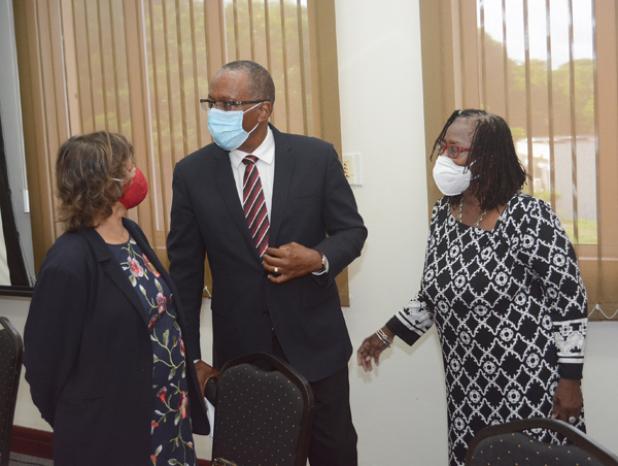
Chief Justice, Sir Patterson Cheltenham (centre), in conversation with Her Excellency Lilian Chatterjee, High Commissioner of Canada to Barbados (left); and the OECS and Regional Project Director of the IMPACT Justice Project, Professor Velma Newton.
EMBRACE MEDIATION
A properly organised national mediation scheme could be a game-changer when it comes to reducing case backlogs in the court system and supporting community conflict resolution, thereby providing greater access to justice.
This is the view of Regional Director of the Improved Access to Justice in the Caribbean (IMPACT Justice) Project, Professor Velma Newton, as she addressed the opening ceremony of a mediation workshop for eight magistrates and one judge at the Cave Hill School of Business and Management recently.
Professor Newton reminded participants that this workshop follows a Practice Direction (No.2 of 2019) issued by the then Chief Justice to provide mediation in the Magistrates’ Courts of Barbados.
“The Practice Direction provides for the appointment of a Mediation Co-ordinator, a Code of Ethics for mediators, procedures for referring cases to mediation and the forms to be used for this purpose.”
Professor Newton explained that there is also a Means Assessment Form to be used to determine whether a person whose case has been referred to mediation has the means to pay the $150 for the first mediation session and an additional $50 per hour thereafter if a further session is needed.
“IMPACT Justice’s research has revealed that no mediation programme is in place in the Magistrates’ courts of Barbados and one respondent to our query has said that the cost could be a deterrent, since many of the persons appearing before magistrates are often unemployed or low-wage earners.
“I would like to stress that IMPACT Justice is not here to question why no mediation system has as yet been implemented in the Magistrates’ courts of Barbados, because we know from experience that more than one course is usually needed, especially if a mediator wants to specialise in family, commercial or community mediation.
“What we are doing today is sensitising magistrates and a representative of the judiciary to mediation procedures and how they can be used as alternatives to court proceeds, to produce successful outcomes.”
Professor Newton said that work in the field has suggested that governments in the region, other than that of Jamaica, need to embrace mediation by setting up comprehensive national strategies for improving the training infrastructure for mediations.
“These should include providing a national register for mediators, licensing persons to offer both standardised and specialised mediation training with provision for updating skills, training some Justices of the Peace to provide mediation services at a cost to the public and ensuring that mediation training programmes are deployed virtually to enable participation from multiple locations,” she said. (JH)
